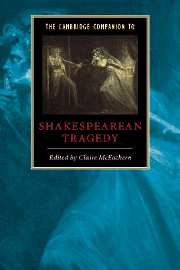Book contents
- Frontmatter
- 1 What is a Shakespearean tragedy?
- 2 The language of tragedy
- 3 Tragedy in Shakespeare’s career
- 4 Shakespearean tragedy printed and performed
- 5 Religion and Shakespearean tragedy
- 6 Tragedy and political authority
- 7 Gender and family
- 8 The tragic subject and its passions
- 9 Tragedies of revenge and ambition
- 10 Shakespeare’s tragedies of love
- 11 Shakespeare’s classical tragedies
- 12 The critical reception of Shakespeare’s tragedies
- 13 Antony and Cleopatra in the theatre
- Select bibliography
- Index
- Series List
8 - The tragic subject and its passions
Published online by Cambridge University Press: 28 May 2006
- Frontmatter
- 1 What is a Shakespearean tragedy?
- 2 The language of tragedy
- 3 Tragedy in Shakespeare’s career
- 4 Shakespearean tragedy printed and performed
- 5 Religion and Shakespearean tragedy
- 6 Tragedy and political authority
- 7 Gender and family
- 8 The tragic subject and its passions
- 9 Tragedies of revenge and ambition
- 10 Shakespeare’s tragedies of love
- 11 Shakespeare’s classical tragedies
- 12 The critical reception of Shakespeare’s tragedies
- 13 Antony and Cleopatra in the theatre
- Select bibliography
- Index
- Series List
Summary
The poet John Dryden, writing near the end of the seventeenth century, criticized Shakespeare for failing to respect the unity of character in his tragedies: 'The last property of manners is, that they be constant, and equall, that is, maintain'd the same through the whole design: thus when Virgil had once given the name of Pious to Aeneas, he was bound to show him such, in all his words and actions through the whole Poem.' According to Dryden, the playwright is bound by the canons of realism – rules that characters as represented in literary works ought to manifest a high degree of psychological and behavioural consistency. Thus for Aeneas to be himself – to have the identity of Aeneas – he should be pious in mind as in deed. For Dryden, this artistic requirement is grounded in a conviction that real human beings are psychologically consistent and, as such, the autonomous source of their meanings. Self-sameness in a person's behaviours flows from an invisible self-identity. This inner identity is the product of a disembodied consciousness that sees the world as the objectified instrument of its own willed designs. The ‘I’ with which an individual represents him- or herself to the world is fully present to itself and thus can be held accountable for its words and deeds.
- Type
- Chapter
- Information
- The Cambridge Companion to Shakespearean Tragedy , pp. 142 - 159Publisher: Cambridge University PressPrint publication year: 2003
- 1
- Cited by



